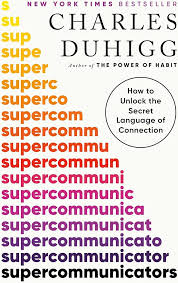Have you met someone who is a highly effective communicator who engages you in enjoyable and helpful conversations with ease? Why are they so effective at making conversation? Recently, I read Charles Duhigg's terrific book, Supercommunicators: How to Unlock the Secret Language of Connection. Charles earned a Pulitzer Prize as a writer for the New York Times. Many years ago, he was my student in the MBA program at Harvard Business School. In Duhigg's book, he explores the behaviors and methods of people who are particularly effective at connecting with others. When he published the book, Duhigg sat for an interview with McKinsey & Company. He commented on one very important trait of supercommunicators:
Supercommunicators ask ten to 20 times more questions than the average person. Those questions can include something like, “That’s interesting. What did you think of that?” or “What did you say next?” They pose questions that invite us into the conversation. Some of their questions are “deep questions.” These questions ask people about their values, beliefs, or experiences. An example of this could be as easy as saying, “You’re a lawyer. What made you decide to go to law school?” They ask questions that dig into learning who people are. They aren’t overly intimate questions but an opportunity to share who we are. People love the opportunities to share those things, which could feel amazing.
Duhigg notes that supercommunicators also are very good at detecting the type of conversation in which others wish to engage. Is it an emotional, practical, or social conversation? Many people mistakenly approach all conversations as practical ones, i.e., we are trying to solve a problem together. Sometimes, though, others do not want help coming up with a plan of action or making a decision. Instead, they want to share how they are feeling and would like someone to simply listen and empathize. In short, you have to understand the purpose of the conversation. In other words, what does the other party want from the dialogue?
Finally, Duhigg stresses one technique that is very helpful in any conversation. The term for this approach is "looping for understanding." Sometimes, people describe it as the "playback" method. When we engage in looping or playback, we are listening actively, restating what we believe we have heard, and then we seek confirmation from the other party. In short, we ask: Did I understand you correctly? That question enables others to clarify their thoughts and helps us avoid misunderstandings.

No comments:
Post a Comment